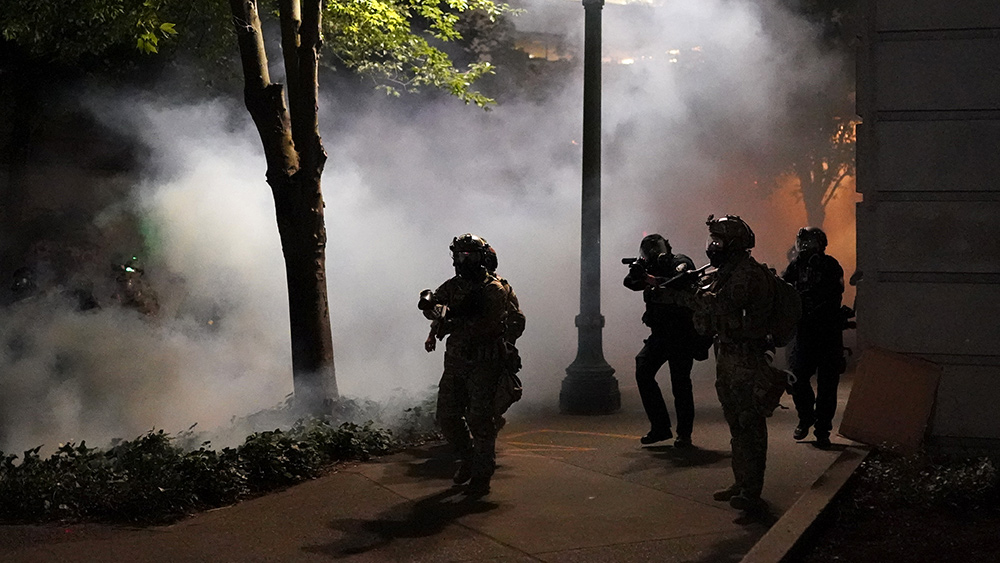BEWARE voter fraud: Texas AG says 134 felony charges have been filed against Gregg County Commissioner and three associates
10/12/2020 / By Zoey Sky

Thanks to Texas Attorney General Ken Paxton, a county commissioner, his wife and two others were arrested in September on voter fraud charges in a 2018 primary election.
Corruption at the highest level
Paxton, a Republican, revealed that Gregg County Commissioner Shannon Brown, a Democrat, Marlena Jackson, Charlie Burns and DeWayne Ward were accused of participating in an organized vote harvesting scheme during the 2018 Democratic primary.
Officials said the group falsely claimed that certain voters were disabled so that they could obtain absentee ballots. However, this was done without the voters’ knowledge or consent, who all reported being young and able-bodied. (Related: Democrat judges who approved election law changes were acting “unlawfully,” will likely be overturned.)
In Texas, voters can only vote by mail if they are over 65, outside their home county during the election, confined in jail or disabled. However, state law doesn’t specify how “disabled” is defined. The issue has also been politicized and litigated for months during the pandemic.
The Texas Supreme Court ruled that a lack of immunity to the coronavirus is not in itself enough to qualify. Beyond that, voters must decide for themselves if their health situation meets the state’s criteria.
Disabled voters applying for an absentee ballot must check a box affirming they have a disability. While they’re not required to provide any documentation or details, disabled voters must first certify that the information they provide is correct and acknowledge that giving false information is a crime.
Local election officials don’t have the authority to verify a voter’s disability status. Both voting rights advocates and advocates for people with disabilities are concerned that local prosecutors might pursue and try to prosecute voters who cite disabilities to vote by mail.
In a statement, Paxton warned that the incident proves just how easily “elections can be stolen outright by mail ballot fraud.” Election fraud, especially “an organized mail ballot fraud scheme orchestrated by political operatives, is an affront to democracy and results in voter disenfranchisement and corruption at the highest level,” added Paxton.
Mail ballots aren’t foolproof and they’re vulnerable to diversion, coercion, and influence by organized vote harvesting schemes. Paxton also warned that Brown’s case proves his commitment to ensuring Texas has the most secure elections in the country.
Paxton also thanked the Gregg County Sheriff and District Attorney for their assistance. He concluded that anyone who tries “to manipulate the outcome of elections in Texas must be held accountable.”
An underserved win in 2018
Indictments obtained by the Epoch Times showed that a grand jury returned 23 felony counts against Brown, 97 counts against his wife Jackson, and a combined 14 counts against Burns and Ward.
Counts include fraudulent use of mail ballot applications, unlawful possession of ballots and illegal voting. If convicted, defendants face jail time — some up to 99 years.
Brown’s office didn’t respond to a request for comment, and the other defendants couldn’t be reached.
Brown won the 2018 primary election by only five votes over his challenger, former Longview City Councilwoman Kasha Williams, a Democrat.
In the March Democratic primary, county election results showed that Brown won a narrow victory, with 1,047 votes to Williams’s 1,042. The bulk of Brown’s votes were from at least 500 absentee ballots while Williams received less than 200.
Mail-in ballots are vulnerable to cheating and fraud
The investigation was prompted by a complaint filed in 2018 by Rev. D.J. Nelson. The Epoch Times left a message at Nelson’s church, but it hasn’t been answered as of Sept. 25, Friday.
Nelson was interviewed by KETK shortly after he filed the complaint. He noted that in the state, nine percent of the ballots cast were absentee. Nelson added that “in Gregg County[,] it was 32 percent.”
Later that year, Gregg County Elections Administrator Kathryn Nealy told the Longview News-Journal that mail-in ballots in precinct four were under observation for the longest time. Nealy added that the same group of people is used every election “because they get paid for it.”
Nealy didn’t reveal their names, but she claimed that “there is an organized group out there who thinks that this is their job.” She declined to comment when reached by the Epoch Times.
In a statement, State Sen. Bryan Hughes and state Rep. Jay Dean, both Republicans, said that the indictments followed a month-long investigation.
Voting by mail is crucial for elderly voters and disabled citizens,” explained Hughes. Because mail-in ballots are also vulnerable to cheating and fraud, the authorities will do whatever it takes to “protect Texas election integrity.”
“The alleged account of voter fraud appears so clearly to be a problem in our districts, but we are encouraged by the attention it has brought to the issue, both here and statewide, and by the opportunity to fix this problem,” added Dean.
Register and exercise your right to vote
Gregg County has 71,729 registered voters and lies in east Texas, near the border with Louisiana. The indictments follow concerns about fraud in what will be an “unprecedented utilization of mail-in voting” for the upcoming Nov. 3 presidential election.
In September, mail-in ballots, a lot of which were cast for President Donald Trump, were discarded in Pennsylvania.
Meanwhile, trays of mail, along with absentee ballots, were discovered in Wisconsin.
Early in September, Paxton successfully petitioned the state Supreme Court to stop Harris County officials from sending over two million mail-in ballot applications. He claimed that doing so “would create voter confusion and jeopardize the integrity and security of our elections.”
Brown, Jackson, Burns, and Ward are out on bond. Court records revealed that the four defendants are set to be arraigned Oct. 9.
America is gearing up for the upcoming presidential elections. However, this also means unscrupulous candidates will do whatever it takes to garner more votes than the opposition come Nov. 3. Do your part, register and exercise your right to vote.
Sources include:
Tagged Under: absentee ballots, ballot fraud, Constitution, crimes, election fraud, elections, electoral procedure, electoral process, fraud, judiciary, legislature, mail in voting, mail voter fraud, mail-in ballots, rigged, Texas, US Constitution, vote fraud, voter fraud
RECENT NEWS & ARTICLES
COPYRIGHT © 2017 GREATERTEXAN.COM
All content posted on this site is protected under Free Speech. GreaterTexan.com is not responsible for content written by contributing authors. The information on this site is provided for educational and entertainment purposes only. It is not intended as a substitute for professional advice of any kind. GreaterTexan.com assumes no responsibility for the use or misuse of this material. All trademarks, registered trademarks and service marks mentioned on this site are the property of their respective owners.




















